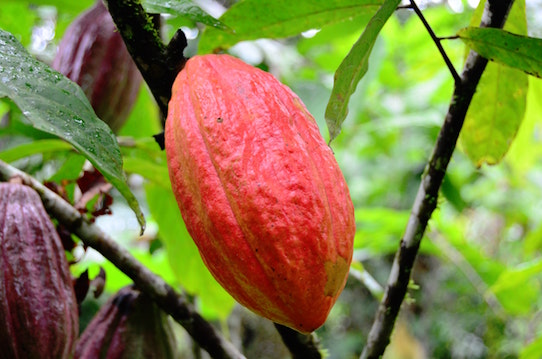 Photo: Jose Cuerva
Photo: Jose Cuerva
We all love chocolate, therefore we love cacao since it is chocolate's main ingredient :).
It is a well-known fact that cacao is a feel-good food. We feel very happy and emotionally elated when we eat it. But why?
There is a very good physiological-chemical explanation for it.
Cacao contains a number of powerful anti-depressant amino acids - tryptophan, phenylalanine, tyrosine. (Ref. 1)
These amino acids help increase the levels of important brain neurotransmitters - serotonin and dopamine - whose action on the central nervous system makes us experience happiness and emotional highs. (Ref. 2 and 3)
Another unique neurotransmitter enhanced in the brain by cacao - anandamide - is even called a *bliss* chemical because we feel great when it is released into our systems. (Ref. 4)
Apart from that, cacao powder is simply a fabulous superfood supplying the body with an amazing array of nutrients. (Ref. 5)
Cacao Powder: Nutritional Overview
Containing high levels of healthy fats, carbohydrates, proteins and dietary fibre (ref. 1), cacao is undoubtedly a high-energy food. It is an excellent choice for those trying to overcome tiredness and chronic fatigue.
At the same time, cacao may also reduce appetite and help you achieve your personal weight-loss targets. Researchers suggest that cacao may have an anti-obesity effect thanks to the ability of its polyphenols to suppress fatty acid synthesis, while stimulating cell energy expenditure in the mitochondria. (Ref. 6)
Cacao is extremely high in anti-oxidants as well; some estimates even place cacao's anti-oxidant potential at many times higher than that of blueberries. (Ref. 5)
Cacao is one of the best sources of magnesium - an absolutely essential mineral required by the body for heart health and blood pressure normalization, detoxification and general strengthening of our immune system, among many other functions. (Ref. 1)
We often come across people on a raw food diet who feel very happy and inspired with whatever they do in their lives - almost flying in the skies.
As we know, dark chocolate is a major component of raw-food diets. Could eating dark chocolate be one of the reasons for raw-foodists' happiness :)?
Of course, it is most likely a combination of many good foods that they consume, although we are pretty sure cacao plays a major role here as well.
Please note that we advocate consumption of (raw organic) plain cacao powder or dark chocolate - since conventional milk chocolate found in supermarkets is filled with dairy and usually contains large amounts of refined sugar.
We dare suggest here that many brain-related disorders could, at the very least, be relieved if patients decided to consume pure organic cacao on a regular basis.
Cacao enjoys a cult-like status in its native Mexico.
I often recommend cacao to my friends and family and consume it regularly myself.
Sometimes, if I take too much coffee and my heart gets a bit sore, I try to take cacao at the same time as well - it certainly reduces coffee-related side effects experienced by the heart muscles.
As a side note, my heart HAS NOT been sore for a long time now.
Cacao Powder and Cardiovascular Disease
Cacao is certainly considered to be a "heart food".
Let's take a further look at how regular consumption of cacao powder and other cacao products can support the function of the cardiovascular system.
Several population studies confirm that high cacao intake is associated with a decreased risk of cardiovascular disease.
Researchers believe that such protective vascular effects may be attributed, among other things, to cacao's numerous flavanols which include catechins, epicatechins and procyanidins. As antioxidants, cacao flavanols may scavenge harmful free radicals and bind to toxic metals within our bodies. (Ref. 7)
Cacao flavanols may also help with maintaining optimal levels of nitric oxide in the body. Nitric oxide is crucial for vasodilation (widening of blood vessels), which also helps prevent blood pressure from rising. (Ref. 8)
Written: Irina Bright
Original publication date: 2014
Republication date: 2020
References
1. USDA Nutrient Data Laboratory (2013). Nutrient data for 19165, Cocoa, dry powder, unsweetened. Release 25. Retrieved May 31, 2013 from: https://ndb.nal.usda.gov/ndb/foods/show/5966?fg=&man=&lfacet=&count=&max=&sort=&qlookup=&offset=&format=Full&new=
2. Yamada T, Yamada Y, Okano Y, Terashima T, Yokogoshi H (2009). Anxiolytic effects of short- and long-term administration of cacao mass on rat elevated T-maze test. Published in The Journal of nutritional biochemistry. Retrieved May 31, 2013 from: https://www.ncbi.nlm.nih.gov/pubmed/18976895
3. Kosman VM, Stankevich NM, Makarov VG, Tikhonov VP (2007). Biologically active substances in grated cocoa and cocoa butter. Published in Voprosy Pitaniya. Retrieved May 31, 2013 from: https://www.ncbi.nlm.nih.gov/pubmed/17674523
4. Thozhukat Sathyapalan, Stephen Beckett, Alan S Rigby, Duane D Mellor, and Stephen L Atkin (2010). High cocoa polyphenol rich chocolate may reduce the burden of the symptoms in chronic fatigue syndrome. Published in Nutrition Journal. Retrieved May 31, 2013 from: https://www.ncbi.nlm.nih.gov/pmc/articles/PMC3001690/
5. Stephen J Crozier, Amy G Preston, Jeffrey W Hurst, Mark J Payne, Julie Mann, Larry Hainly, and Debra L Miller (2011). Cacao seeds are a "Super Fruit": A comparative analysis of various fruit powders and products. Published in Chemistry Central Journal. Retrieved May 31, 2013 from: https://www.ncbi.nlm.nih.gov/pmc/articles/PMC3038885/
6. I. Andjar, M. C. Recio, R. M. Giner, and J. L. Ros (October 2012). Cocoa Polyphenols and Their Potential Benefits for Human Health. Published in Oxidative Medicine and Cellular Longevity. Retrieved May 31, 2013 from: https://www.ncbi.nlm.nih.gov/pmc/articles/PMC3488419/
7. Monica Galleano, Ph. D., Patricia I. Oteiza, Ph. D., and Cesar G. Fraga, Ph.D. (December 2009). Cocoa, chocolate and cardiovascular disease. Published in Journal of Cardiovascular Pharmocology. Retrieved July 16, 2013 from: https://www.ncbi.nlm.nih.gov/pmc/articles/PMC2797556/
8. Csar G. Fraga, Mara C. Litterio, Paula D. Prince, Valeria Calabr, Brbara Piotrkowski, and Mnica Galleano (December 2010). Cocoa flavanols: effects on vascular nitric oxide and blood pressure. Published in Journal of CLinical Biochemistry and Nutrition. Retrieved July 16, 2013 from: https://www.ncbi.nlm.nih.gov/pmc/articles/PMC3022066/